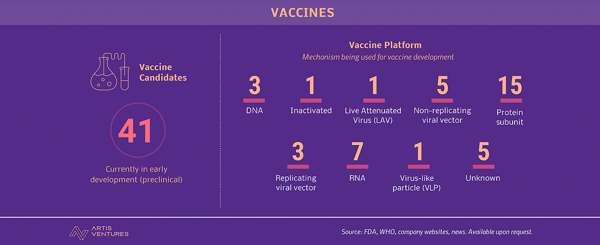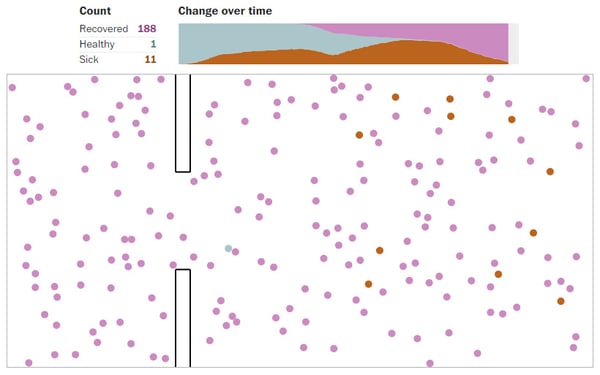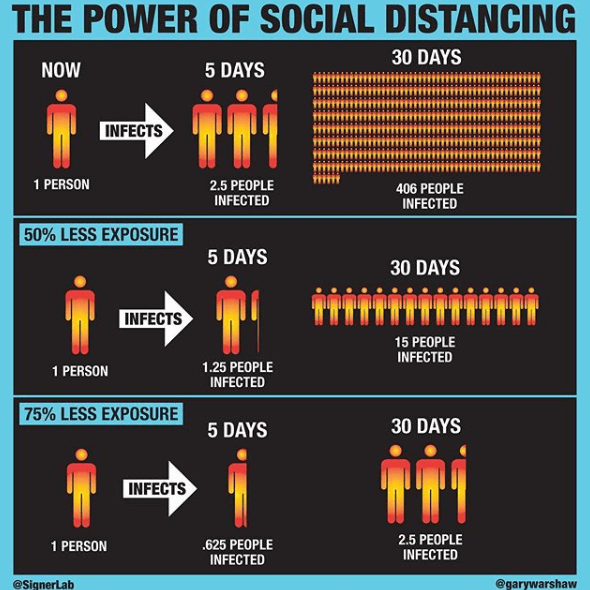
COVID-19 is an infectious disease, a global pandemic, and a mega-sized roadblock to business operation. To provide our readers with an overview update and information on the disease as well as assisting businesses to function efficiently in this dire time, TRG creates this info hub.
We will keep this hub updated as frequently as possible so anyone looking to gain more knowledge on this pandemic can have instant access to reliable resources whenever needed.
Coronavirus under the microscope, from its origin, symptoms, prevention, and more.
Coronavirus is a large family of viruses that can cause illness in animals and cause respiratory infections in humans, ranging from the common cold to the more contagious diseases such as Middle East Respiratory Syndrome (MERS) and Severe Acute Respiratory Syndrome (SARS).
COVID-19 (previously known as "2019 novel coronavirus") is an infectious disease caused by a brand new type of coronavirus, Severe Acute Respiratory Syndrome Coronavirus 2 (SARS-CoV-2).
On 11 March 2020, WHO declared COVID-19 a pandemic after carefully assessing the disease's impacts, severity, and the world's actions.

Credit: Decoding COVID-19, South China Morning Post
Healthcare researchers worldwide are working tirelessly to learn more about this new coronavirus as well as developing remedies for the pandemic.
Many diagnostic tools and kits have been approved for used by the FDA-EUA and CE Mark. Treatments and vaccines are still underway.

Credit: Visual Capiltalist, published on 1 April 2020
Learn more:
Common symptoms found in cases that are tested positive with COVID-19 disease includes:
Other symptoms might include:
The majority of cases have been mild, and 80% of them have been able to recover without the need for special treatment. However, people who age 60 and above and people who have pre-existing medical conditions, such as high blood pressure, heart problems, diabetes, are more susceptible to the COVID-19 disease.
The incubation period for this disease can range from anywhere between 1 to 14 days, with the majority of cases showing symptoms around day five.According to the latest study by the National Institutes of Health, CDC, UCLA and Princeton University, the new coronavirus can remain on surfaces for several hours up to a few days, depending on the type of surfaces.
To be specific, scientists have found that the virus can remain stable:
To prevent getting infected through touching contaminated surfaces, disinfecting these surfaces with regular cleaning products and having a proper handwashing regime are best practices. In addition, avoid touching the eyes and mouth areas as well as undertaking precautionary measures mentioned in the section underneath are highly recommended.
To slow the transmission of COVID-19 and to prevent yourself from getting infected, the World Health Organisation (WHO) advises to do the following:
Washing your hands with soap and water can greatly reduce the spread of germs and infectious diseases, thus, protecting yourself and your family.
According to the Centres for Disease Control and Prevention (CDC), you should wash your hands:
If you do not have access to soap and clean water, then you can clean your hands with hand sanitizer that contains at least 60% alcohol. However, hand sanitizers may not be effective as they cannot get rid of all types of germs.
Furthermore, it is also unnecessary to purchase soaps that are labelled "antibacterial" in your local supermarkets. According to the U.S. Food and Drug Administration (FDA), there is not enough evidence proving they are more beneficial in preventing germs and bacteria. Therefore, just washing your hands regularly with plain soap and water and practicing social distancing is the best possible resolution amid the COVID-19 outbreak.
If you read guidelines on WHO or CDC's website, there is yet to be any recommendation on universal facemask wearing.
This statement, however, is under review in recent weeks as more and more studies and experts raise their voice to back up the use of masks in public.
While Western officials are still hesitating, many Asian countries that experienced a tremendous surge of cases, namely Hong Kong, Taiwan, and South Korea, are starting to show signs of slowing down. The slowing down is partly due to people at these countries are used to wearing facemasks in public.
In an interview with NPR, Scott Gottlieb, former FDA Commissioner, commented: "Face masks will be most effective at slowing the spread of SARS-CoV-2 if they are widely used, because they may help prevent people who are asymptomatically infected from transmitting the disease unknowingly."
Though there is yet to be a confident yes that facemasks can be greatly beneficial, they do provide a little protection. Today, a little help is better than no help at all.
Speaking to CNN, Ivan Hung, an infectious diseases specialist at the Hong Kong University School of Medicine, said that "if you look at the data in Hong Kong, wearing a mask is probably the most important thing in terms of infection control. And it not only brings down the cases of coronaviruses, but it also brings down the influenza."
One major issue, though, is signifciant mask shortages for first responders and medical workers. If it becomes mandatory for the general public to wear facemasks, what do we need to do to reserve N95 and surgical masks for those that need them most?
Many have turned to reusable facemasks. To back up this trend, the internet recently has been suggesting videos after videos of DIY masks made from T-shirts and scrap fabric. Even shawls, scarves, bandanas, or anything that can cover up the mouth and nose areas are also utilised.
Learn more: What you should know about DIY masks and ventilators, National Geographic
Certainly, mask-wearing should be practised together with proper handwashing regime, physical distancing and other measures to mitigate the pandemic. What the world needs right now is updated instructions on whether we can make these masks at home and how to wear them properly from the higher authorities.
The following are advice from the CDC for individuals who are sick with COVID-19 or think they might have been infected. To ensure a safe environment for your family and the community, please closely follow the steps below and seek immediate medical attention when possible.
Stay healthy, manage complex business changes, and grow with these powerful solutions.
If you have shown signs of being infected, you should immediately self-isolate and seek medical advice.
If you are feeling perfectly healthy but wish to flatten the coronavirus curve, you need to adopt social distancing immediately.
Social distancing is an approach highly recommended by experts to reduce social interactions between people, and therefore, reducing the risk of transmitting the COVID-19 disease.
 Credit: Coronavirus Simulator, The Washington Post
Credit: Coronavirus Simulator, The Washington Post
Social distancing is simple and straightforward. This precautionary method requires you to:

Credit: Gary Warshaw, IG: @garywarshaw
Can I still go outside during social distancing?
As long as you can maintain a fair distance away from other people.
Can I go shopping?
Many retailers, grocery stores, pharmacies, and supermarkets have developed delivery strategies and online shopping platforms to aid the needs of their clients during this dire time. As such, it is best to shop online as it carries much less risk to your health.
Can I go and get a haircut?
It is best to avoid it for now as hair salons attract lots of frequent patrons.
My house is safe, can I invite friends over?
It is not recommended. But if you do have friends over, be extra cautious by maintaining a safe distance between each friend, making sure they wash their hands upon arrival, and disinfecting your place afterwards. Otherwise, organising a virtual party is not a bad idea after all.
How long should I implement social distancing for?
It is unknown when to stop isolating ourselves. It could be days, weeks, or until a vaccine for COVID-19 is found.
This question is also addressed in a Vox's interview with University of Pennsylvania social epidemiologist Carolyn Cannuscio. Below is her interview.
Why do you need a work-from-home policy right now? The short answer is it will soon become inevitable as the number of confirmed cases keep soaring, and there is yet to be a viable cure in the foreseeable future.
More and more individuals are adopting social distancing. The only way for businesses to stay operational is to roll-out work-from-home policy where applicable.
There are 5 steps to implementing a work-from-home policy:
TRG has created a definitive guide to creating a virtual workplace, which explains the above 5-step approach in detail as well as tips to working efficiently during social distancing. Check it out here!
Don't let social distancing bring you down! No time is better than now to protect and improve your health with a balanced diet and adequate exercising to boost your immune system.
Healthy eating
You can certainly develop a healthy meal plan within budgeting by taking into account the food that your family likes, your preparation methods as well as time and effort it takes to cook a meal.
Furthermore, by planning your meals in advance, you can minimise the need to visit the supermarket or order multiple times online.
It is advised to stock up on foods that can stay fresh for a long period, such as canned/ frozen vegetables, eggs, beans/ legumes, nuts, milk, and meat.
You may be tempted to purchase snacks such as chips, cookies, or sodas but these foods are high in empty calories and can potentially crank up your grocery bills so think twice when buying them
Another food item to minimise purchasing is pre-made/ frozen dinners. They might be delicious and save you precious time, but be aware that most of them are high in sodium, fat, and calories.
Social distancing with kids? Involve your kids during the planning, prepping your daily meals and the cleaning afterwards. The American Society for Nutrition has some tips on teaching your children writing, math, reading, and science while doing these chores. Check them out here.
Exercise frequently
In a quick interview with CBS New York, chiropractor Dr. Joseph D. Salamone commented: "Everybody's going to be in sitting postures, having text neck." Posture is one health obstacle as many people are working on their phones and computers at home as opposed to their usual work desks.
To maintain a healthy spine, Dr. Salamone recommended doing three stretches daily after waking up:
You can still go jogging or going for a walk outside if you can keep a safe distance away from fellow joggers.
On the contrary, you can also exercise within the comfort of your living room using a wide range of exercising clips publicly available on Youtube. Like this cardio for beginners video by POPSUGAR Fitness for example.
Exercise not only can help you to decrease stress and anxiety, but it also helps you to sleep better. Dedicate a specific time in your day and plan your exercise just like planning your meals and stick with your schedule.
The outbreak can cause stress and fear. Taking good care of your mental health is critical when you are spending the majority of time at home, with kids, and your regular social activities are postponed indefinitely.
You can take this chance to try out a new relaxation technique to avoid consuming too much speculation that can fuel anxiety.
Try to stay connected with family members and friends via social media, phone, email, or an emotional support helpline.
Your children's health is also important. They can feel alarmed with constant exposure to the negative impact of the pandemic. Ask your children to be involved in planning your daily health routine and try to engage your kids in explaining today's matters is also essential.
This article by the CDC and this one by the UK's Mental Health Foundation are great reads on helping you to manage anxiety, stress, and mental health during the coronavirus outbreak.
If you need professional help, talk to our Founder and CEO, Rick Yvanovich, who is also a certified Executive Coach. Learn more about Rick and his field of expertise via the button below.
The world has become increasingly volatile, uncertain, complex, and ambiguous (VUCA). On top of that, we have the COVID-19 pandemic, which is neither expected nor resolvable.
During this turbulent time, there is still a window of opportunity for businesses to accelerate their digital transformation initiatives and "bring socio-economic activities online," exclaimed Mr. Nguyen Manh Hung, Minister of Information and Communications.
Many retail businesses have employed different strategies to adapt to the new normal, such as implement cashless payment for all services, faster deliveries, offer a wider range of products online, etc.
Vietnamese Government also encourages enterprises in Vietnam to digitally transform. Mr. Hung commented that the Government is currently considering policies for "mobile payment, certification for online learning, banning outdated technology imports, promoting the production of low-priced smartphones, and e-Government."
One undeniable fact is this pandemic is changing the way every business operates. With travel restrictions, social event cancellations, and social distancing measures, we have to opt for a more agile and virtual method to connect with our inner circles as well as the world.
Cloud services have been available for years and have proven its scalability, availability, and security. Cloud-based applications are the solution to this VUCA world.
Thanks to cloud technologies that we have web-based business applications, file storing and sharing services, social collaboration tools, Virtual Private Network (VPN) and many other great innovations.
Many of you already utilise TRG's fully managed cloud services which enable you to operate from anywhere. To learn more about these cloud services and our digital advisory services please visit our website or contact your local account team.
No - We do not expect any disruption of our services due to COVID-19. We designed the cloud services with a high degree of resiliency across multiple data centres in separate geographical locations.
No - We do not expect any disruption of our support service levels due to COVID-19. We designed our support to operate 100% virtually from multiple countries for resiliency.
Will my services for ongoing projects be impacted?
No - We do not expect any disruption of our services due to COVID-19. We are able to deliver our services 100% virtually. Our Project and Account Managers will work with you to identify and mitigate any risks.
Will TRG travel on-site to my offices?
Just like you, we all want to remain safe during this time. As such we are exercising social distancing and have suspended all international travel and have highly restricted domestic travel. We follow both country-specific and customer-specific travel advisories/ policies. We can deliver 100% virtually as required.
Should you have any questions, please contact TRGHelp@TRGInternational.com or your local account team.
Advice on international and domestic travels, emergency numbers by country.
For live updates on global COVID-19 confirmed cases, please refer to this map designed by Johns Hopkins University of Medicine.
The CDC recommends travellers to avoid nonessential travels to countries that are categorised as Warning Level 3. Level 3 signifies a widespread, ongoing transmission of the COVID-19 disease.
To monitor the level of severity country by country, please click here to be directed to CDC's Travel Health Notices during COVID-19.
At the time of conducting this guide, destinations with a Level 3 Travel Health Notice, according to CDC, are:
|
Africa |
South Africa |
|
Asia |
China, India, Indonesia, Iran, Israel, Japan, Malaysia, Pakistan, Philippines, Qatar, Saudi Arabia, Singapore, South Korea, Thailand, Turkey |
|
Europe |
Austria, Belgium, Czech Republic, Denmark, Estonia, Finland, France, Germany, Greece, Hungary, Iceland, Ireland, Italy, Latvia, Liechtenstein, Lithuania, Luxembourg, Malta, Monaco, Netherlands, Norway, Poland, Portugal, Romania, San Marino, Slovakia, Slovenia, Spain, Sweden, Switzerland, United Kingdom (England, Scotland, Wales, and Northern Ireland), Vatican City |
|
North America |
Canada |
|
Oceania |
Australia |
|
South America |
Brazil, Chile, Ecuador |
All nonessential travel to CDC's list of Warning Level 3 destinations should be avoided.
Travel to Level 2 destinations are acceptable with extra precautionary measures. Senior citizens and individuals with pre-existing medical conditions are advised to avoid nonessential travel.
Travel to Level 1 destinations are acceptable, but it is critical to practice preventative measures to prevent spreading and transmitting the disease.
Layovers at airports in countries with a level 3 travel health notice also face a high risk of being infected, and therefore, should be avoided.
If a layover is unavoidable, do not attempt to leave the airport. You might be subjected to screening and testing upon arrival at your destination.
According to the CDC, the risk of infection on an aeroplane is fairly low due to how it is designed to circulate and filter air.
Nevertheless, do take precautionary measures such as wash your hands properly, avoid contacting people who are visibly sick, avoid touching high-risk surfaces. More preventative methods can be found in the section "How to prevent COVID-19 infection" above.
There might be a chance you are travelling with a sick passenger, who is considered to be a public health risk, you might be subjected to screening at your destinations.
For more travelling FAQs during the time of COVID-19, including cruise ship travelling and returning from a level 3 travel health notice destination, please visit CDC's Travel Advice page.
Credit: Visual Capitalist
As of 18:00, 24 Mar 2020, HCMC authorities have ordered the closure of all restaurants (including eateries, cafes and similar venues) with a capacity of 30 seats and above, gyms, beauty salons and other similar facilities. The closure is expected to be until 31 Mar 2020. Previously, entertainment facilities such as cinemas, karaoke bars, massage parlours, bars and clubs, gaming centres were ordered to shut down since 15 Mar.
All international flights into Tan Son Nhat International Airport have been suspended, including flights carrying Vietnamese citizens, from 25 Mar to 31 Mar 2020. All travellers entered Vietnam prior to this date were automatically quarantined at collective camps for 14 days.
Only Vietnamese and foreign diplomats and officials are allowed to enter Vietnam. All entrants are required to fill out health declaration forms and are subjected to 14-day quarantine upon arrival.
Prime Minister Nguyen Xuan Phuc has ordered all international flights into Vietnam to be suspended, though the specific timeframe is yet to be given.
The Ministry of Health has advised all travellers entering Vietnam from 1 Mar to self-isolate for 14 days if they have not been quarantined.
Vietnam railway has suspended several domestic routes from Hanoi and HCMC from 16 Mar 2020. Passengers taking trains, long-haul buses, tourist boats, and domestic flights are also required to fill out health declaration forms.
Facemasks are mandatory when in public such as airports, bus stations, markets and supermarkets, and on public transport.All schools have been suspended until further notice. Several events have been either postponed or cancelled according to authorities' protocols, including:
Furthermore, several tourist sites are also shut down temporarily until the end of March. Popular sites such as Ha Long Bay, Cat Ba, Bai Tu Long Bay, Ninh Binh, Phong Nha, My Son Sanctuary, Hue Citadel, and Perfume Pagoda are not receiving guests at the moment.
If you are a visitor currently travelling through Vietnam, please take sensible preventative measures as mentioned in this guide. Please practice social distancing, wear facemask in public places, and avoid travelling if you are experiencing fever, coughing, and difficulty breathing.
If you are sick with COVID-19 or think you might be infected, please immediately contact Vietnam's health hotline 19009095 / 19003228.
Please visit:
TRG will try our best to update this list as frequent as possible and to include more countries.
|
Egypt |
|
|
India |
|
|
Indonesia |
|
|
Kazakhstan |
|
|
Kenya |
Reporting illness: 719 or text *719# County Hotline numbers:
COVID-19 Updates in Kenya | UNHCR |
|
Malaysia |
|
|
Nigeria |
|
|
Pakistan |
|
|
Philippines |
|
|
Singapore |
|
|
Thailand |
|
|
UK |
|
|
USA |
IT, Talent and F&B - we think it's a great combination.
We've thrived since 1994 resulting in lots of experience to share, we are beyond a companion, to more than 1,000 clients in 80+ countries.

© 2023 TRG International. Privacy Policy / Тerms & Conditions / Site map / Contact Us
TRG encourages websites and blogs to link to its web pages. Articles may be republished without alteration with the attribution statement "This article was first published by TRG International (www.trginternational.com)" and a clickable link back to the website.
We are changing support for TLS 1.0 and older browsers. Please check our list of supported browsers.